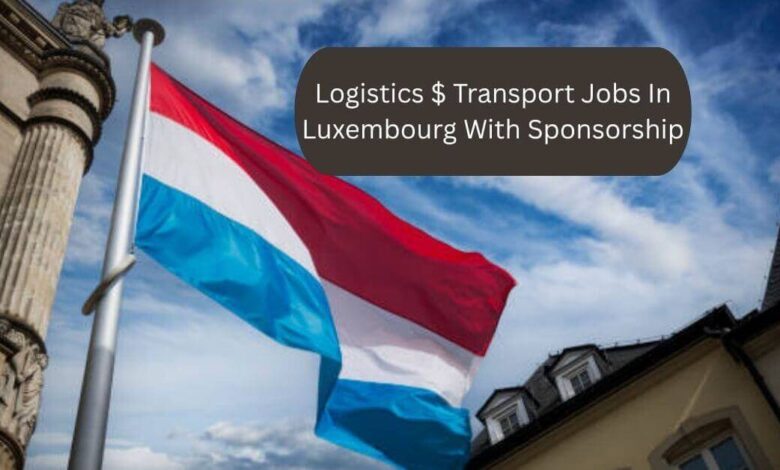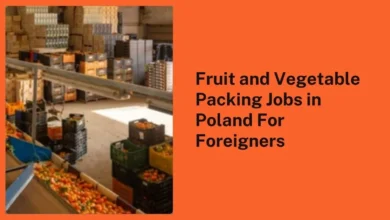Logistics & Transport Jobs In Luxembourg With Sponsorship

If you’re looking for a well-paying, hands-on career in Europe, Luxembourg’s logistics and transport sector offers an exciting path. Most of these roles are on-site (physical), ranging from warehouse and delivery jobs to logistics planning and fleet management.
Salaries are attractive entry-level logistics roles earn €22–25 per hour (€3,500–€4,500/month), truck drivers make €35,000–€55,000 annually, and logistics coordinators earn €40,000–€50,000 per year.
While experience in transport, warehousing, or driving is an advantage, many employers also train newcomers and even sponsor work visas for qualified non-EU candidates eager to build a career in Europe’s logistics hub.
List of Transport Occupations in Luxembourg:
- Logistics director: The role of a coordination director is primarily focused on the transportation of products, rather than travelers. This position may be responsible for the supervision of distribution centers, conveyances, and stock systems.
- Supply chain professional: A supply chain master analyzes transportation data and advises a company on the most efficient method of transporting its products.
- Transportation build: By analyzing activity information, developing change plans, and supervising enhancements, a transportation build contributes to the advancement of the transportation framework.
- Yardmaster: A yardmaster is responsible for the coordination of trains, the supervision of laborers, and the planning of maintenance and repair activities to ensure that cargo is delivered to its destination on time.
- Distribution center director: A dissemination center chief typically supervises the distribution center personnel and regulates the flow of products into and out of a stockroom or plant.
- Fleet chief: The armada supervisor position is frequently analogous to that of a transportation officer; however, it may involve additional administrative duties, such as evaluating loads and coordinating with suppliers.
Skills and certifications:
Here are a few abilities a transportation officer uses:
- Communication skills: A transportation officer is frequently required to coordinate with other officers, transporters, material transport companies, and individuals or products that are being transported. They can also effectively manage delays and botches due to their exceptional communication skills.
- Geographical information: A transportation officer can establish optimal routes by possessing a comprehensive understanding of the geology and structure of the region they oversee.
- Logistical skills: The transportation officer must ensure that individuals and goods arrive at their destination on time by optimizing the pace of transportation, fuel efficiency, and staff planning.
- Knowledge of vehicles: The transportation officer is able to organize the efficient use of each vehicle in their armada by understanding the capacity, fuel requirements, and driver capabilities which are essential.
- Knowledge of methods, laws, and controls: A significant number of transportation officers are employed in positions that are either directed by the government, such as the transportation of military supplies or detainees, or are required to fulfill the requests of the industry, such as the transportation of time-sensitive medicines and equipment for hospitals.
- A commercial driver’s license (CDL) is required by most states to operate large vehicles, such as buses and large trailers. Therefore, a transportation officer may require it to operate a few armored vehicles.
- CPR and first aid certifications: These certifications may be essential for a transportation officer who is capable of assisting passengers.
- Security clearance: A security clearance is required for certain transportation officer positions that involve the transportation of detainees or high-ranking officials.
Benefits:
- Enticing Compensation and Benefits:
Wages that are competitive in comparison to those of other EU countries: Truck drivers earn between €35,000 and €55,000 annually. Warehouse personnel: €24,000–€32,000 annually Coordinators/Managers: €40,000–€70,000 annually Weekend incentives, overtime pay, and holiday pay are frequently awarded. Numerous employers provide a 13th-month salary as a year-end incentive. Free or subsidized housing, sustenance, or transportation allowances are included in certain positions. - Sturdy Social Benefits:
Access to Luxembourg’s public healthcare system, which is considered one of the most exceptional in Europe. Paid vacation leave (minimum of 26 days per year). Protections for unemployment, medical leave, and parental leave. Once integrated into the system, state pensions and contribution-based benefits will be available. - Skill Development and Career Growth:
Entry-level positions, such as warehouse laborer or delivery driver, may result in: Inventory controller, dispatch coordinator, and forklift operator Subsequently, logistics superintendent or fleet manager The employer provides reimbursement for certification opportunities, including CPC, ADR, forklift, and safety. Knowledge of contemporary logistics systems (GPS fleet management, SAP, WMS). - Work Environment that is Multilingual and Cultural:
Luxembourg is a country that speaks three languages—French, German, and Luxembourgish—and logistics professionals frequently employ English. Foreigners constitute nearly 50% of the populace, and the country is hospitable to international laborers. Employers in the logistics sector are accustomed to facilitating the integration of non-EU workers. - Central Location for EU-Wide Logistics:
Working in Luxembourg places you at the epicenter of European supply channels, with connections to the Netherlands, Belgium, Germany, and France. Opportunities for cross-border logistics experience, which enhances the long-term value of one’s career throughout Europe.
Salary:
In Luxembourg, the average net compensation of a transportation coordinator is 54,816 euros, which is equivalent to an hourly rate of 26 euros. They receive a standard reward of 883 euros during expansion. The compensation indicators are constructed from compensation overview data that is directly obtained from Luxembourg’s managers and executives.
How to Apply?
Simply Apply by clicking the link below:
Conclusion:
Luxembourg’s logistics and transport sector offers high-paying, stable careers with visa sponsorship for international workers. From warehouse roles to management positions, every job supports Europe’s growing trade network. It’s more than just work it’s a chance to build a future in one of Europe’s most connected and welcoming countries.
Frequently Asked Questions:
-
Which transport & logistics jobs in Luxembourg offer visa sponsorship?
Truck / HGV Drivers (long-haul & regional): High demand in cross‑border transport; many employers sponsor work visas for qualified drivers
Delivery Drivers (vans/cargo): Full- or part-time roles in e-commerce and courier services exploring sponsorship for foreign hires
Warehouse Operators & Forklift Drivers: Entry-level to semi-skilled roles with paid training and sponsorship support
Logistics Coordinators: Skilled positions requiring shipment planning, client coordination; employers sometimes sponsor work permits or EU Blue Cards for experienced candidates -
What visa or work permit structures support sponsorship?
Employer‑sponsored Work Permit (salaried worker permit) is the most common route for third‑country nationals. Employers must first post the vacancy on ADEM for 3 weeks before hiring externally
EU Blue Card may apply for higher‑skilled roles like logistics coordinators or managers, provided salary thresholds are met
Short‑term season permits sometimes apply for temporary or peak‑period hiring like delivery roles -
What qualifications and requirements are needed?
For Driver Roles:
Valid Category C or C+E (HGV) license, convertible to Luxembourg format.
Clean driving record; often CPC (Certificate of Professional Competence).
Basic to intermediate English, with French or German giving a big advantage in daily operations



